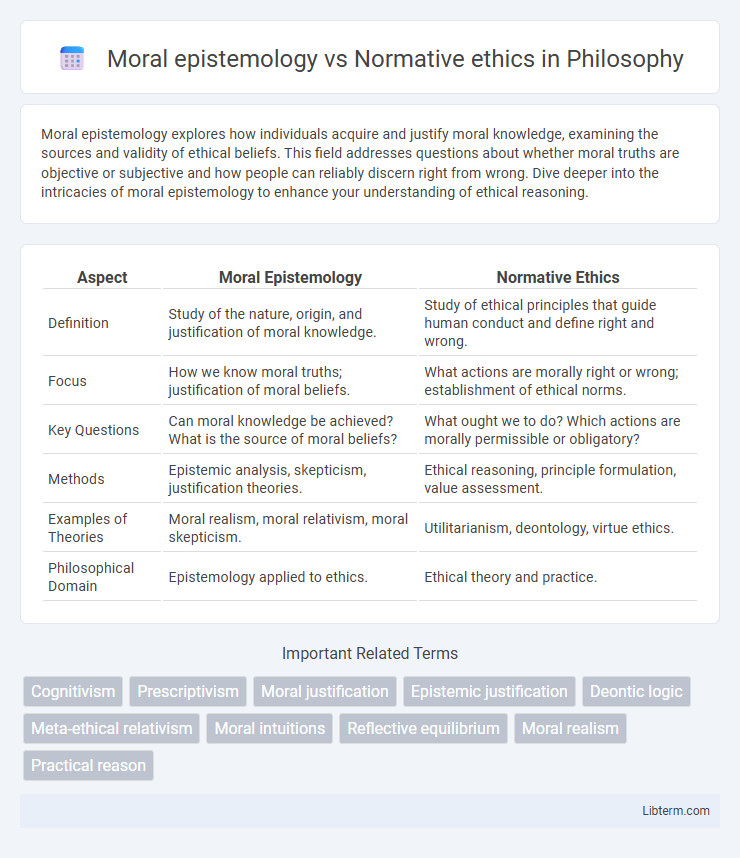Moral epistemology explores how individuals acquire and justify moral knowledge, examining the sources and validity of ethical beliefs. This field addresses questions about whether moral truths are objective or subjective and how people can reliably discern right from wrong. Dive deeper into the intricacies of moral epistemology to enhance your understanding of ethical reasoning.
Table of Comparison
| Aspect | Moral Epistemology | Normative Ethics |
|---|---|---|
| Definition | Study of the nature, origin, and justification of moral knowledge. | Study of ethical principles that guide human conduct and define right and wrong. |
| Focus | How we know moral truths; justification of moral beliefs. | What actions are morally right or wrong; establishment of ethical norms. |
| Key Questions | Can moral knowledge be achieved? What is the source of moral beliefs? | What ought we to do? Which actions are morally permissible or obligatory? |
| Methods | Epistemic analysis, skepticism, justification theories. | Ethical reasoning, principle formulation, value assessment. |
| Examples of Theories | Moral realism, moral relativism, moral skepticism. | Utilitarianism, deontology, virtue ethics. |
| Philosophical Domain | Epistemology applied to ethics. | Ethical theory and practice. |
Introduction to Moral Epistemology and Normative Ethics
Moral epistemology explores the nature, origin, and justification of moral beliefs, focusing on how individuals acquire and validate moral knowledge. Normative ethics examines ethical theories and principles that prescribe how people ought to act, offering frameworks such as deontology, utilitarianism, and virtue ethics to guide moral behavior. Understanding the distinction involves recognizing moral epistemology's role in assessing the credibility of moral claims, while normative ethics provides the evaluative standards for moral decision-making.
Defining Moral Epistemology: Foundations and Scope
Moral epistemology examines the origins, nature, and justification of moral beliefs, focusing on how individuals acquire and validate ethical knowledge. It explores the cognitive processes involved in discerning moral truths and the criteria that distinguish justified moral claims from mere opinions. This field lays the epistemic groundwork for normative ethics by addressing the question of how moral knowledge is possible and reliable.
What is Normative Ethics? Concepts and Theories
Normative ethics explores the principles and criteria that determine moral right and wrong, aiming to provide a foundation for ethical decision-making. Key theories in normative ethics include consequentialism, which judges actions by their outcomes; deontology, which emphasizes duties and rules; and virtue ethics, which focuses on character and moral virtues. This branch of moral philosophy contrasts with moral epistemology, which investigates the nature and justification of moral knowledge and beliefs.
Key Differences Between Moral Epistemology and Normative Ethics
Moral epistemology investigates the nature, origin, and scope of moral knowledge, emphasizing how individuals acquire and justify ethical beliefs through perception, reasoning, and experience. Normative ethics focuses on establishing the criteria and principles that determine what actions are morally right or wrong, guiding behavior through frameworks such as utilitarianism, deontology, and virtue ethics. The key difference lies in moral epistemology's concern with the justification and understanding of moral facts, whereas normative ethics prescribes the standards for moral conduct and decision-making.
Major Questions Addressed by Moral Epistemology
Moral epistemology examines the nature, origin, and justification of moral beliefs, addressing major questions such as how we acquire moral knowledge, what constitutes justified moral belief, and whether objective moral truths exist. It investigates the reliability of moral intuitions, the role of reason versus emotion in moral judgment, and the epistemic status of moral disagreement. Normative ethics, in contrast, focuses on determining which moral principles or rules are correct and how individuals ought to act.
Dominant Approaches within Normative Ethics
Dominant approaches within normative ethics include consequentialism, deontology, and virtue ethics, each offering distinct criteria for moral evaluation. Consequentialism emphasizes the outcomes of actions as the basis for determining moral rightness, while deontology focuses on adherence to moral duties and rules regardless of consequences. Virtue ethics centers on character traits and moral virtues as essential to ethical behavior, contrasting with moral epistemology, which investigates the nature and justification of moral knowledge rather than prescribing ethical actions.
How Moral Knowledge Influences Ethical Norms
Moral epistemology examines the nature, origin, and justification of moral knowledge, providing a foundation for understanding ethical norms. This knowledge shapes normative ethics by informing the principles and rules that guide moral behavior and decision-making. The interplay between moral epistemology and normative ethics ensures that ethical norms are grounded in well-substantiated moral understanding rather than mere intuition or cultural convention.
Intersections: Where Moral Epistemology Meets Normative Ethics
Moral epistemology investigates the foundations, justification, and methods for acquiring moral knowledge, while normative ethics focuses on establishing the criteria for what actions are morally right or wrong. The intersection of these fields occurs when evaluating how justified moral beliefs inform ethical principles and guide moral reasoning in practical decision-making. Understanding this relationship enhances the reliability of ethical theories by grounding normative claims in epistemic justifications about moral facts or values.
Challenges and Criticisms in Both Fields
Moral epistemology faces challenges in establishing reliable methods for justifying moral beliefs, often criticized for its reliance on intuition and the difficulty of resolving moral disagreements through empirical means. Normative ethics encounters criticisms related to the prescriptive nature of its theories, such as utilitarianism or deontology, which may struggle to account for complex moral situations or cultural diversity. Both fields grapple with the tension between objective moral truths and subjective interpretation, complicating the pursuit of universally applicable ethical standards.
Conclusion: Integrating Understanding for Ethical Decision-Making
Moral epistemology provides the foundation for understanding how we acquire knowledge about moral truths, while normative ethics offers frameworks for determining what actions are morally right or wrong. Integrating insights from both fields enhances ethical decision-making by combining rigorous justification of moral beliefs with practical guidance for behavior. This synthesis supports more coherent, informed, and actionable ethical judgments in complex moral scenarios.
Moral epistemology Infographic

 libterm.com
libterm.com